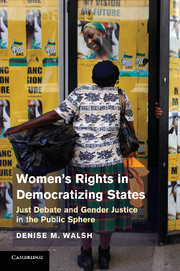3 - Probing and Testing Just Debate
Published online by Cambridge University Press: 06 December 2010
Summary
“It is often simply naïve to think that the best of democratic norms will always produce good outcomes.”
James BohmanINTRODUCTION
This book focuses on debate conditions in the leading institutions in the public sphere. I argue that as the openness and inclusiveness of debate conditions increase, the content of public debate will broaden to include greater demands for gender justice, putting pressure on the state to respond and promote women's rights. A sophisticated body of deliberative theory underpins the just debate approach. However, its validity is not self-evident. Transitions to democracy produce a more expansive public sphere that enables greater public participation, yet democratizing states have rarely offered significant advances in women's rights. Does this mean the just debate approach promises more than it can deliver? To answer this question, I explore the plausibility of the just debate approach through a comparison of socialist and post-socialist Poland, and then test it through two paired comparisons: first in authoritarian Chile and South Africa, and second during two time-periods in post-apartheid South Africa.
The just debate approach is derived from critical deliberative theory, which is intent on exposing the limits of liberal democracy. Yet I apply the just debate claim during late socialist rule in Poland and in authoritarian Chile and South Africa, when these regimes openly aimed to limit debate in the public sphere.
- Type
- Chapter
- Information
- Women’s Rights in Democratizing StatesJust Debate and Gender Justice in the Public Sphere, pp. 55 - 76Publisher: Cambridge University PressPrint publication year: 2010



